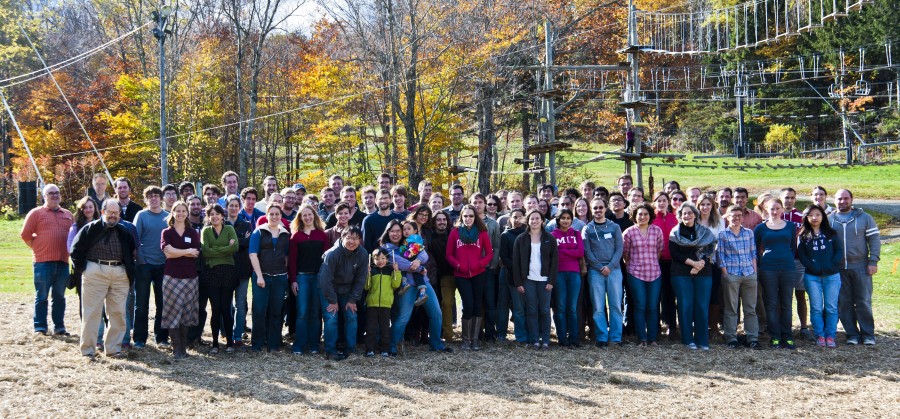PAOC Spotlights
The 2013 PAOC Retreat: Sun and Science on Jiminy Peak
MIT’s Program in Atmospheres, Oceans, and Climate (PAOC) oversees a broad program of education and research in atmospheric, oceanic, and climate sciences in The Department of Earth, Atmospheric, and Planetary Sciences (EAPS). They are engaged in fundamental problems such as the physics of hurricanes, the dynamics of ice ages, and the role of the ocean in climate change. Every year, our faculty, graduate students, post-docs and staff go off for a retreat supported by the Houghton Fund.
The 2013 PAOC Retreat took place at the beautiful Jiminy Peak Resort in Hancock, MA over the weekend of October 18-20. The quintessential Massachusetts’ autumn scenery, endless food and drink, fascinating research talks, stellar variety show, and chances to learn new things about colleagues are just a bunch of memories now, but certainly worth remembering.
The theme of this year’s PAOC retreat was “Blurring the Lines: Science at the Edge of PAOC Disciplines.” After Friday night’s socializing, we woke up early for a talk by David Archer, a professor at the University of Chicago who has long studied the Earth’s response to various greenhouse gases. He focused on the importance of understanding that while about 20% of the carbon dioxide (CO2) we emit will stay in the atmosphere for thousands of years, methane gas hangs around for only a decade. And so he calls himself a “CO2 absolutist,” by which he means that emissions reductions policies should zero in on CO2 because future generations are stuck with the warming effects of CO2, not methane. He analogized methane to good cholesterol and CO2 to bad cholesterol to emphasize that fossil fuel burning can cause irreversible climate change.
At the research round-up, each of the attending faculty, students, post-docs, and science writer gave a 1-minute spiel about his or her current project, which was a great way to brush up on current PAOC topics, ranging from cloud dynamics to phytoplankton metabolism and from island-ocean precipitation contrasts to Oceans at MIT‘s one-year anniversary. The retreaters had their pick of sunny afternoon activities, including a ropes course, games, and mountain hikes.
Yet the weekend’s highlight was Saturday night’s Variety Show, hosted by PAOC’s one and only Yavor Kostov whose flair for improvised wit and impeccable timing had the audience laughing for an hour. The night featured a jovial bonanza of graduate student talent, including a violin solo by classically trained Daniel Rothenberg, an apple-splitting demo by Jay Brett and Laura Stevens, and a spoken word performance of original poems about afternoon slumps in MIT’s Green Building by Emily Zakem, Isabela Le Bras, and Sarah Rosengard.
Sunday’s first talk featured Mick Follows, Associate Professor in MIT’s EAPS, who took a historical approach to phytoplankton diversity with the colorful story of Sir Alister Hardy, an expert marine biologist and, much later, a proponent of the fringe theory that humans evolved in aquatic environments. In the 1930′s, he designed and built the Continuous Plankton Recorder (CPR), a contraption that collects plankton samples as it is towed behind a ship, storing them on a moving spool of silk and preserving them in formalin. Ever since, Hardy’s CPR has collected data from the North Atlantic and North Sea on the biogeography of plankton in a program run by the Sir Alister Hardy Foundation for Ocean Science.
Heather Deese, an oceanographer at Maine’s Island Institute, spoke about alternative trajectories for PhDs in ocean and atmospheric sciences, such as fisheries management, environmental consultation, ocean policy work, and science communication. Susan Solomon wrapped up the retreat with this year’s ‘State of PAOC,’ which, it seems, is healthy and evolving in the direction of climate science. See photos of the retreat on the PAOC Flickr Photostream.
